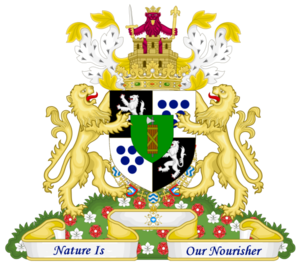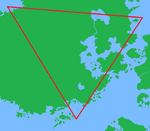Jaaguzan
| Jaaguzan | |
 | |
| Full name | Hakim bin Alsalam |
|---|---|
| AKA | Jaaguzan, Frederik Harald of Markland, Frederik Harald Llængjarl |
| Physical information | |
| Species | Human |
| Gender | Male |
| Hair color and style | darkbrown |
| Eye color | blue |
| Skin color | white |
| Other | beard |
| Biographical information | |
| Father | Mahmud bin Alsalam |
| Mother | Fatima Ayreon-Kalirion ibn al-Majeed bin Sathrati |
| Date of birth | 1682 AN |
| Place of birth | Castle Islàn in Hyfrost |
| Date of death | N/A |
| Place of death | N/A |
| Residence(s) | Agra |
| Nationality | Çakaristan, Hurmu, Shireroth |
| Allegiance(s) | House of Alsalam |
| Occupation | Shahanshah of Çakaristan, Emir of Arbor, Emir of Al-Khandra |
Hakim bin Alsalam (13.X.1682 AN, Hyfrost), known by his titular name Jaaguzan (Babkhi: جایگزین) is the first Shahanshah of Çakaristan and second ruler of Çakaristan. He was elected after the assassination of Akbar and consolidated the Çakar Empire. In Hurmu, he is Prince among the Lakes.
He was born with the name Frederik Harald des Vinandy Ayreon-Kalirion ibn al-Majeed bin Sathrati af Ettlingum Freyu de Ravarie, but that changed in Hakim bin Alsalam' when the Franco-Batavian Empire fell and his parents moved to Arbor. His parent adopted an Arboric styled name and also renamed their children. The name Hakim (Arboric: حكيم) means wise. He is born from the marriage of Mahmud bin Alsalam (formerly known as: Arkadius Frederik Gustavus des Vinandy) and Fatima Ayreon-Kalirion ibn al-Majeed bin Sathrati (formerly known as: Esther Fatima Gudrid). Hakim is Mahmud's fourth child and third son, and Fatima's first child and first son. He is the elder twin brother of Atiya bint Alsalam.
Youth
At the age of three, Hakim fled with his sisters and parents to the Arbor Isles. There, the Emirate of Arbor began and Hakim lived in the Al Hamra Palace. Later, he lived under an alias in Batavia, where he studied at the Royal Julius Civilis University. Back in Arbor, Hakim started his military training. This was interrupted by his flight to Çakaristan with his brothers and sisters. Under the protection of the Sultan of Çakaristan, Hakim underwent military training in Çakaristan.
Rise to power
After the shameful assassination of his parents, Hakim was proclaimed Emir. He returned and took the lead in the fight against the republic. With initially unofficial support from Çakaristan, he managed to achieve great successes. After the end of the Arboric Civil War, his position as Emir was not certain. The occupying powers did not agree on the restoration of the Emirate. In 1704 AN he was nominated by Amir Çakar as a candidate for the Çakar throne to end the Çakari succession crisis. To his own surprise, he was elected. He was given the titular name Jaaguzan, which means substitute.
Jaaguzannama
With Hakim on the Çakar throne, the chronicles began, called Jaaguzannama, which means Book of Jaaguzan. Several series were published:
Family
Marriage
- Main article: Marriage between Jaaguzan and Zahra
On 12.XII.1709, Jaaguzan married Zahra al-Osman, his second cousin once removed. The couple was blessed with the birth of their first child, Aurangzeb, in 1711 AN. According to the marriage contract, he is his father's heir apparent.
Concubines
By decision of the Majlis al-Shuwraa, the Zenana was set up. It is unknown how many women make up the Zenana. The marriage contract with Zahra also provides for concubines for Jaaguzan. The known concubines are:
- Delara Khatun
- Ceyda Khatun
- Timna Khatun
Children
- Aurangzeb Hakimi bin Alsalam (1711 AN), with Zahra;
- Mahmud Hakimi bin Alsalam (1712 AN), with Delara;
- Meera Hakimi bint Alsalam (1713 AN), with Zahra;
- Akbar Hakimi bin Alsalam (1715 AN), with Timna;
- Fatima Hakimi bint Alsalam (1715 AN), with Delara;
- Daniyal Hakimi bin Alsalam (1716 AN), with Zahra;
- Bahadur Hakimi bin Alsalam (1717 AN), with Ceyda;
- Shahid Hakimi bin Alsalam (1717 AN), with Delara;
- Samira Hakimi bint Alsalam (1718 AN), with Zahra;
- Azam Hakimi bin Alsalam (1718 AN), with Timna;
- Setare Hakimi bint Alsalam (1719 AN), with Ceyda;
- Rafi Hakimi bin Alsalam (1720 AN), with Zahra.
Houses, Titles and Styles
Houses
By rights Hakim belongs to the following Houses:
- House of Alsalam, junior branch of House of Vinandy;
- House of Ayreon-Kalirion;
- House of Ettlingar Freyu.
Titles
Hakim's (as Frederik Harald) full titles were until 1685: Earl of Markland, Earl of Frosta, Imperial Prince of Francia, Prince of Amokolia, Prince of Elwynn, Prince of Neustria, Prince of Ravaria, Prince of Shireroth, Prince of Uppland, Prince of Vinandy, Archduke of 's Koningenwaarde, Llængjarl of Elwynn, Marcherjarl of Uppland, Duke of Brandenburg, Duke of Gascony, Duke of Levensburg, Count of Arietta, Count of Bourbon, Count of Dasburgh, Count of Girond, Count of the Lady Esther Isles, Count of Northshire, Baron of Ammerswoude and by the Loet, Baron of Bergkirche, Baron of Heydelberg, Lord in Jorvik, Lord of Audinghen, Lord of Paravel, Knight of the Holy Lakes, Scion of St. Harald, Scion of the King of Kings.
In 1703 AN, Hakim became Emir of Arbor after his father was killed. In 1704 AN, he was elected Shahanshah of Çakaristan (King of Kings), whereby the title Padishah-i sharq-u gharb (Master King of the East and the West) was also conferred upon him. In 1706 AN, Jaaguzan was granted the title Qayser (Thraci: قیصر), when Kantisha and Northak Islands were incorporated.
Shireroth
In 1711 AN, he was restored to his father's former title Duke of Brandenburg through the ratification of the Treaty of Raynor's Keep. On 5.V.1722, he (along with his legitimate descendants) were restored to the Imperial Family of Shireroth (due to their legitimate descent from Kaiseress Noor, with the title "Prince of Shireroth" (or Princess of Shireroth, as applicable).
Order of the Holy Lakes
He is a member of the Order of the Holy Lakes. From his birth until 1703 AN when his mother died, he was a Knight of the Holy Lakes. In 1703 AN, he inherited the title Prince among the Lakes from his mother. Hakim appears in the lines of Andelarion (twice), Harald (twice), Osman, and Tahmaseb.
On 1.I.1722, he was declared Emir of Al-Khadra in Hurmu, at the same time when the Al-Khadra District was reformed into an emirate in fief to the Order of the Holy Lakes.
Coat of arms in Hurmu

In Hurmu, Hakim uses the coat of arms formerly belonging to the Duchy of the Lady Esther Isles and the District of the Warring Islands. This coat of arms originally represented Lady Esther Ayreon-Kalirion, from whom Hakim derives his claim as the most senior heir to her, and Prince among the Lakes in the Line of Daniel Kalirion.
- First and fourth quarter: The white lion on the black field symbolizes Esther Ayreon-Kalirion (Members of the House of Ayreon-Kalirion are often referred to as lions, as the name "Ayreon" is derived from the Elw word for the Elwynnese lion) The white symbolizes purity, and the black protectiveness.
- Second and third quarter: The traditional coat of arms of Hurmu. The six blue roundels represent the six sacred lakes of Hurmu and the colour white symbolizes the purity of the Brida. For Hakim, this represents his status as Prince among the Lakes, being thus the most senior heir of a ruling Prince of Hurmu.
- The inescutcheon: Coat of arms of Vaan Aujoen ("Hope Islands" in Crandish). These were a group of Crandish islands in the Arctic Ocean. They were later made Storish, and their Storish jarldom, became Esther Ayreon-Kalirion's fief, Esther's only fiefdom.
On 1.I.1710, the day after it was last used by the District of the Warring Islands, Li Naomiai Avon-El, the Chancellor of the Order of the Holy Lakes bestowed this coat of arms upon Hakim bin Alsalam, to be held by him for as long as he is Prince among the Lakes, and to follow whosoever is his heir as Prince among the Lakes, and so on.
Furthermore, the Warring Islands, which the coat of arms represented, was the hold-out of Hakim's parents after the disposition in Franco-Batavia. As such, Li Naomiai saw it fitting to bestow upon Hakim this coat of arms also for that symbology of his parents' escape and place in those islands. See also Villa Hurmu.
The motto, Nature is our nourisher, is derived from a lecture on Hurmu religion, given by Lady Esther:
The Ash and Elm are important symbolic trees for Hurmudans. In our mythology, the humans came from the holy lakes, but were nourished by these two trees, grew strong and conquered the world. That's why we call all humans "children of Ash and Elm". It's to remind us that nature is our nourisher, like a mother or father, and not our slave.
The coat of arms is surrounded by the collar of the Order of the Two Sacred Rivers, a royal order of chivalry from Elwynn's royal era. This marks the representation of Hakim as the most senior descendant of the former monarchy of Elwynn.
Sangunese peerage
In the Sangunese peerage, he holds the title Count Shishin (since 1703)
Honours
 Grand cordon of the Order of As-Saif
Grand cordon of the Order of As-Saif- Grand Cordon of the Grand Order of the Federation of Nouvelle Alexandrie
Ancestry
Ethnically, Hakim bin Alsalam is 3/8 (38%) Batavian, 9/32 (28%) Storish, 15/128 (12%) Babkhi, 5/64 (8%) Hurmudan, 1/16 (6%) Baatharzi, 1/32 (3%) Elw, 1/32 (3%) Amitian, 3/256 (1%) Brookshirerithian, and 3/256 (1%) Hyperborean.
Among his ancestors may be found 4 kings of Batavia (Arkadius I, II, III, and IV), one high king of Stormark (Harald), 12 kaisers of Shireroth (Raynor I, II, III, IV, V, VI, VII, VIII, and IX, and Ayreon I, Aurangzeb, and Hjalmar), three princes of Hurmu (Harald, Andelarion, Daniel), as well as four shahanshahs of Babkha (Ardashir I, Ardashir II, Tahmaseb, and Rashid).
He is a 58th-generation descendant of Kaiser Raynor I through the imperial bloodline of Ayreon-Kalirion.
| Ancestors of Jaaguzan | ||||||||||||||||||||||||||||||||||||||||||||||||||||||||||||||||||||||||||||||||||||||||||||||||||||||||||||||||||||||||||||||||||||||||||||||||||||||||||||||||||||||||||||||||||||||||||||||||||||||||||||||
|---|---|---|---|---|---|---|---|---|---|---|---|---|---|---|---|---|---|---|---|---|---|---|---|---|---|---|---|---|---|---|---|---|---|---|---|---|---|---|---|---|---|---|---|---|---|---|---|---|---|---|---|---|---|---|---|---|---|---|---|---|---|---|---|---|---|---|---|---|---|---|---|---|---|---|---|---|---|---|---|---|---|---|---|---|---|---|---|---|---|---|---|---|---|---|---|---|---|---|---|---|---|---|---|---|---|---|---|---|---|---|---|---|---|---|---|---|---|---|---|---|---|---|---|---|---|---|---|---|---|---|---|---|---|---|---|---|---|---|---|---|---|---|---|---|---|---|---|---|---|---|---|---|---|---|---|---|---|---|---|---|---|---|---|---|---|---|---|---|---|---|---|---|---|---|---|---|---|---|---|---|---|---|---|---|---|---|---|---|---|---|---|---|---|---|---|---|---|---|---|---|---|---|---|---|---|---|
| ||||||||||||||||||||||||||||||||||||||||||||||||||||||||||||||||||||||||||||||||||||||||||||||||||||||||||||||||||||||||||||||||||||||||||||||||||||||||||||||||||||||||||||||||||||||||||||||||||||||||||||||
| Preceded by: Mahmud bin Alsalam |
Emir of Arbor 1703–present |
Succeeded by Incumbent |
| Preceded by: Akbar |
Shahanshah of Çakaristan 1704–present |
Succeeded by Incumbent |
| Preceded by: Fatima of Arbor |
Prince among the Lakes Line of Daniel Kalirion 1703–present |
Succeeded by Incumbent heir-apparent: Aurangzeb Hakimi bin Alsalam |




